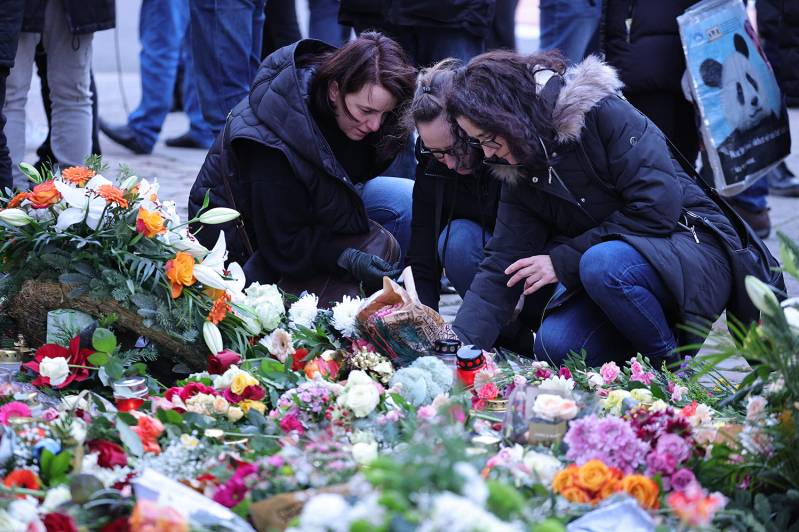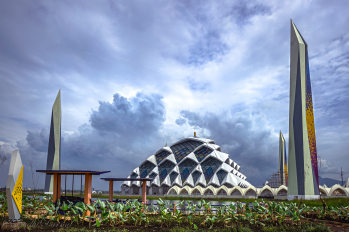
The chairwoman of the Council of the Evangelical Church in Germany (EKD), Bishop Kirsten Fehrs, and the chairman of the German Bishops' Conference, Bishop Georg Bätzing, expressed their shock at the "inhuman attack" at a Christmas market in Magdeburg. In a joint press release, they said: "Many people throughout Germany and around the world are feeling the horror, grief and sympathy today."
At least five individuals, including a 9-year-old child, lost their lives in a tragic attack in the eastern German city of Magdeburg.
The church leaders expressed that thoughts and prayers are with Magdeburg at this time, according to reporting by the German evangelical magazine Pro. The churches are mourning with the relatives of the victims of this terrible attack and praying for the injured and the deceased, as well as for their relatives who are now worried about their loved ones: "So many innocent people have fallen victim to this senseless violence just before Christmas." The two theologians thanked the dedicated emergency services who are caring for the injured and clarifying what happened, as well as the emergency chaplains who are standing by the people and accompanying the traumatized.
The evangelical Idea magazine quoted regional bishop of the Evangelical Church in Central Germany (EKM), Friedrich Kramer (Magdeburg): "We are horrified by the terrible events at the Magdeburg Christmas market. Our prayers and thoughts are with the victims and their families." The Magdeburg Cathedral will be open to everyone from 9 a.m. to 6 p.m. on the day after the attack to seek comfort and express their condolences in silence and with candles.
Attacker originally from Saudi Arabia, known as Islam critic
A 50-year-old Saudi resident of Germany drove an S.U.V. through a bustling Christmas market, exploiting emergency exit routes, officials revealed on Saturday. The attack, which occurred on Friday evening and resulted in five fatalities and over 200 injuries, with 41 people reported to be severely hurt, has left the country grappling for answers.
The attacker, identified as Taleb al-Abdulmohsen, was named during a Saturday news conference at Magdeburg City Hall. Officials are still searching for the reason behind his actions.
Al-Abdulmohsen, a psychiatrist residing in Bernburg, a town approximately 25 miles south of Magdeburg, was taken into custody shortly after the attack. Prosecutors plan to charge him with murder and attempted murder. Originally from Saudi Arabia, he arrived in Germany in 2006 and was granted refugee status a decade later.
While the motive remains unclear, investigators believe al-Abdulmohsen acted alone. Interior Minister Nancy Faeser stated that "it is clear to see" the suspect holds "Islamophobic" views. Social media posts from the suspect indicate his criticism of Islam and promotion of conspiracy theories about an alleged effort to Islamize Europe.
German media outlet Der Spiegel reported that a complaint had been filed against him a year earlier regarding statements that did not constitute a direct threat, according to officials.
Ronni Krug, a Magdeburg City Council member, defended the market's security measures, noting that the emergency routes used by the attacker were vital for ambulance access and were guarded by police. German authorities confirmed the attack was deliberate and emphasized that the suspect had lived in the country for decades on a permanent residency visa.
According to Magdeburg police director Tom-Oliver Langhans, the attacker entered the market via one emergency exit, drove through the crowded lanes lined with festive stalls, and exited through another emergency route. He was arrested shortly after the incident.
The suspect’s social media activity revealed posts criticizing Germany for tolerating radical Islam, support for the anti-immigrant Alternative for Germany party, and warnings about Islamic law in Europe.
German Chancellor Olaf Scholz, alongside his ministers, visited the site on Saturday to lay flowers at a memorial near the market. Scholz’s visit comes as Germany recalls the 2016 Berlin Christmas market attack, where an Islamic extremist used a semi-truck to kill 13 people. Since that tragedy, Germany has bolstered security at holiday markets with concrete barriers, increased police presence, and banned knives.
This year, additional safety measures were implemented across the country after an armed man killed three people at a summer festival in August. In Magdeburg, large painted concrete blocks were placed around the market, which featured festive stalls selling mulled wine, sausages, and gifts. Andreas Rosskopf, head of the federal police union, remarked, however, “It is not 100 percent possible to protect such events.”
In response to the attack, cities across Germany deployed additional patrols to Christmas markets on Saturday. Markets in Cologne banned large bags, while Leipzig increased barriers at entrances.
Magdeburg, a city of 240,000 and the capital of Saxony-Anhalt, was once part of Communist East Germany. Its annual Christmas market, located in front of City Hall, became the site of collective mourning on Saturday as residents placed flowers at a memorial near St. John’s Church.
The floral tribute grew steadily throughout the day, with visibly shaken individuals stopping to pay respects and mourn the victims of this devastating attack.





